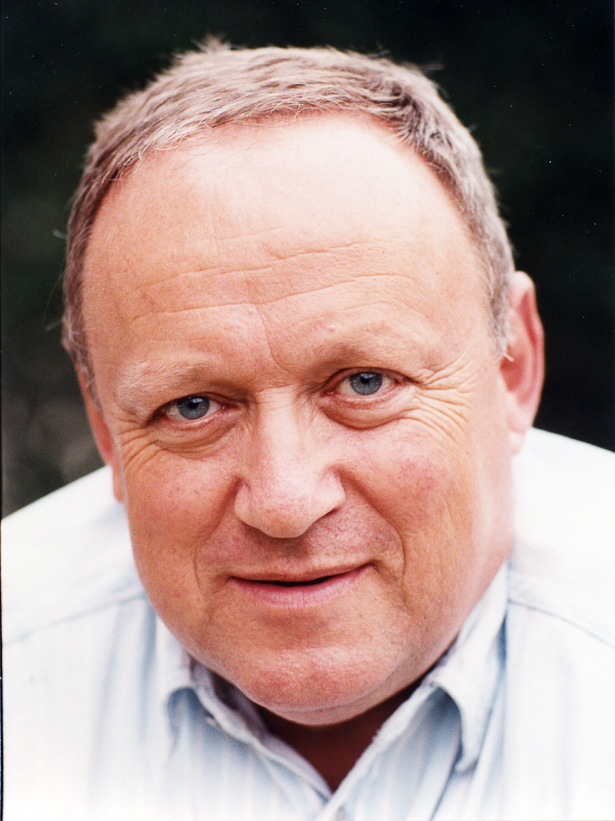
Interviews – I’ve done hundreds. Some are easy – James McCallum for example, will ‘talk ’til the cows come home‘ and always gives good quotes.
Liquigas, Lotto and Teak Sky ex-pro and now Sky’s PR, Dario Cioni used to fill me with dread – but I learned that after five minutes of ‘yes’s, no’s and aahhh’s’ he’d loosen up and you would get some of the most insightful answers about pro bike racing that you could ever wish for.
But the big thing that the tutors tell you at college is; ‘don’t lose control of the interview!’ In other words, don’t let the subject ramble off at a tangent that your readers may not be interested in.
But when my excellent tutor, Mr. Davis Bytheway imparted that golden rule upon me, he had obviously never met Mr. Roger St. Pierre.
And if you’re wondering who Roger St. Pierre is; if you’ve been reading cycling magazines for more than five minutes then you’ve almost definitely have read his work.
When I first became interested in bike racing in the early 70’s his name was synonymous with continental bike racing.
He was from a generation of cycling journalists who’d come up through local cycling clubs, ‘clubbie runs,’ early morning time trials and road races where only the real pace-setters had six speed freewheels.
In those days cycling journalism wasn’t ‘post modern’ or ‘ironic’ – it was about love of the sport.
His writing inspired young riders to want to know more about the continental race scene – and some to up-sticks and head for the flatlands of Flanders.
His love of the sport shows in his writing and he’s recognised now as one of the sport’s premier historians and archivists.
VeloVeritas thought that Roger would be an interesting man to talk to – we didn’t realise the half of it.
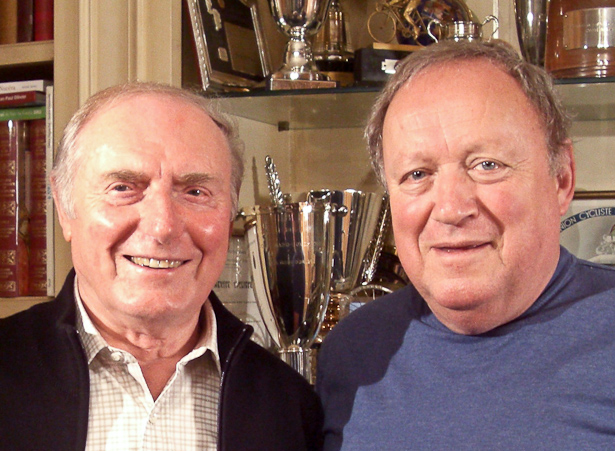
And on the subject of losing control of an interview; I can’t actually remember now what my first question was, but I think it was about his love for music and diversity of skills – as well as love of bike racing.
“I’ve ridden a bike with Frank Zappa in the Bahamas and I happened to be walking by when the Beatles did their famous on the roof publicity stunt recording of ‘Get Back.’
“I have written around 1,500 LP and CD liner notes – everything from Delius and Sibelius to Stan Getz, Dinah Washington and Freddie and the Dreamers. I was at the recording session for Fleetwood Mac’s first album and I sang back-up on a record that topped the charts in Jamaica – though I have go confess my voice is dreadful.
“Besides writing for New Musical Express, Record Mirror and other publications, I was the main contributor to the multi-million selling ’Book of Rock’ encyclopaedia and I ran my own PR company.
“We were the pioneers of disco promotion and also got records played on radio and got acts onto shows like Top of the Pops. We promoted six number-one hits and worked on tours with such stars as the Jackson Five, James Brown, Marvin Gaye, Jerry Lee Lewis, B.B King, the Drifters and Bill Haley, Don Williams, David Soul and the O’Jays.
“I was darts’ correspondent for the Daily Mirror and have edited such diverse titles as Cycling Today, Canoe Focus, Model Magazine, the British Midland Voyager in-flight magazine, Holiday & Leisure World, European Hotelier, and Business Focus – and of course I’ve contributed to many cycling magazines, including Cycling Weekly, The Bike Mag, Pro Cycling, Cycling Plus, American Bicycle, Performance Cycling, Australian Cyclist, Sporting Cyclist and International Cycle Sport.
“I’ve been to 130 different countries and all 50 US states with my work as a travel writer and in my role as a motoring writer I’ve driven close on 2,000 different cars – from a humble 2CV to James Bond’s Aston. and have written 33 published books, subjects including cycling, music, travel – and a history of McDonald’s.
“I’ve been lucky to get paid for doing things others pay to do. I’ve had helicopter lessons, I’ve flown a plane upside down and been down in a submarine, I have ridden Fausto Coppi’s bike and Eddy Merckx’s too.”
You’ll be starting to get the picture, by now?
But I did try…
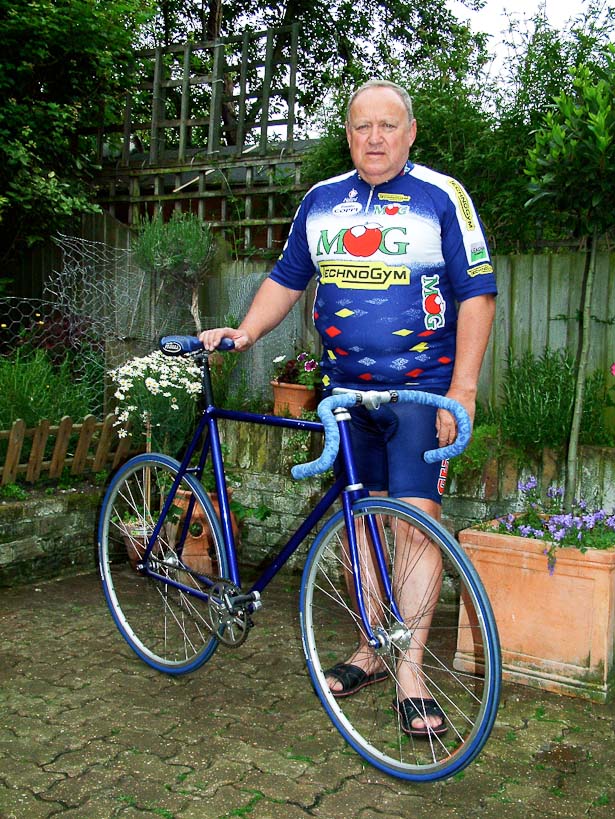
How did you get into writing, Roger?
“I read Enid Blyton when I was five and decided that I wanted to write.
“My first article was published in the Ilford Recorder when I was very young. It was a feature on the Boy Scouts.
“Then, when I was 14 or 15, I wrote to the Romford Times telling them that their coverage of cycling wasn’t any good.
“The sports editor must have thought: ‘Who’s this bumptious little bastard?’
“And he replied that if I thought I could do better, why not submit a report?
“To cut a long story short, after a few weeks, they liked what I was doing and offered me a weekly retainer of 30 bob (£1:50).
“Soon I was doing cycling columns for five local papers as well as stringing for the nationals. I was still at school but earning a grown man’s wage.””
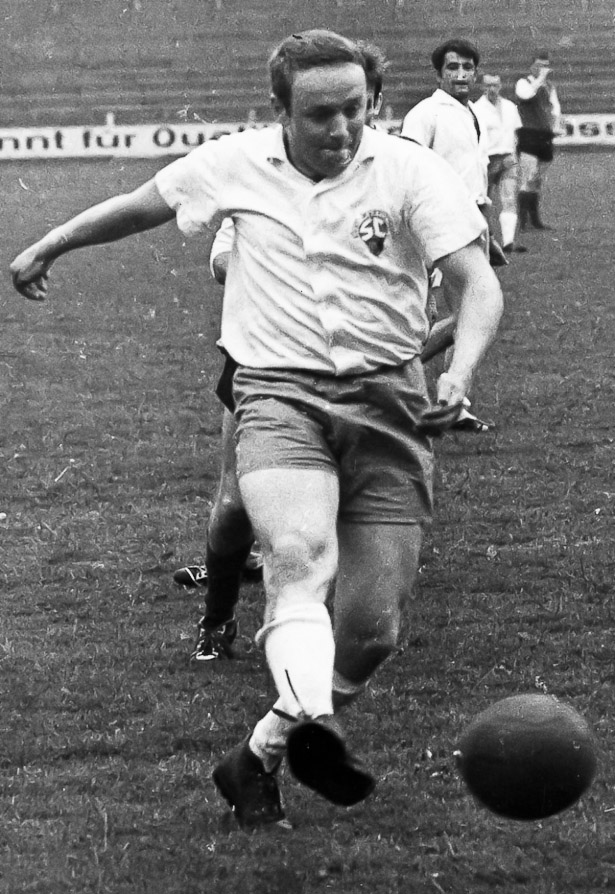
How did you get into cycling?
“All the kids in the street where I lived were two years older than me and would bugger off on their bikes – so naturally I wanted a bicycle.
“Eventually, I got a bike from my cousin Alan, it had 18” wheels but that didn’t stop me from doing decent runs – like the 54 miles round trip to Southend which I did on my own at around seven or eight years of age.
“I started going to watch races and became totally hooked.
“Someone gave me a pile of French and Italian sports magazines, like Miroir Sprint, But et Club and Sport Illustrato and I started working out what the picture captions were saying. Within six months I was fluent in reading French but didn’t actually get to speak to anyone in the language until I was 18.
“I went into a bike shop in Brittany, got chatting and the guy asked if I was from Switzerland – he reckoned that was the accent I had. I had no idea where that had come from.
“The older guys on the local scene took me under their wing and gave me equipment and magazines but I could not afford a de cent bike so I didn’t begin racing as a junior until I was 17 and in full-time work.
“My first club was the Alpine Wheelers, which was just me and a handful of kids at Ilford County High School.
“I then joined the Acme Road Club, helped re-form the famous Romford Racing Club then joined the Zeus Racing Club’s junior team and got a win and 11 top six placings in my first season, as well as being elected club secretary, a role I still held a decade later when we amalgamated with the Romford Wheelers to form the Havering CC.
“As well as competing myself and attaining first-category status, I organised some big races in Essex for the independents (semi-pros) of the day
“I raced until I was 40 and rode at Herne Hill for 21 years. A couple of years after I moved from Ilford to South London to be near the track, I joined the ’34 Nomads with which club I rode for the rest of my career. I also raced in France with the Dunkirk club, travelling over by ferry, riding to a nocturne (night race) and being back at my desk in London next morning. I also got to race in Ireland, Spain, Belgium, Canada and the USA but without any real success.
“Additionally, I took numerous teams abroad, including the GB team in the 1973 Tour of Newfoundland and several pro squads.
“There was a bit of a conflict for me back when I started out because I was racing in some high level events and then staying up late at night writing about the races I’d just ridden in. Of course you can’t do justice to both roles but I couldn’t give up either.
“I remember riding the Tour of Ireland then, while my mates took an early meal and trotted off to bed, I’d be off to the press room and still filing copy at 2 am.
“But that dual role served me well, because I got to know the riders on equal terms while the great cycling writers of that era – Jock Wadley, Peter Bryan, Sid Saltmarsh – taught me how to be a real journalist
“Very early on I got a job as ‘Saturday’ boy at the old Cycle Sport weekly newspaper – nothing to do with the modern magazine of the same title.
“One of the sub-editors was a wonderful old guy named Bill Mills. He liked his half bottle of Scotch and one of my jobs was to pop out to the off-licence for him. I can remember having to prop him up in phone boxes as he filed his reports from the Tour of Britain.”
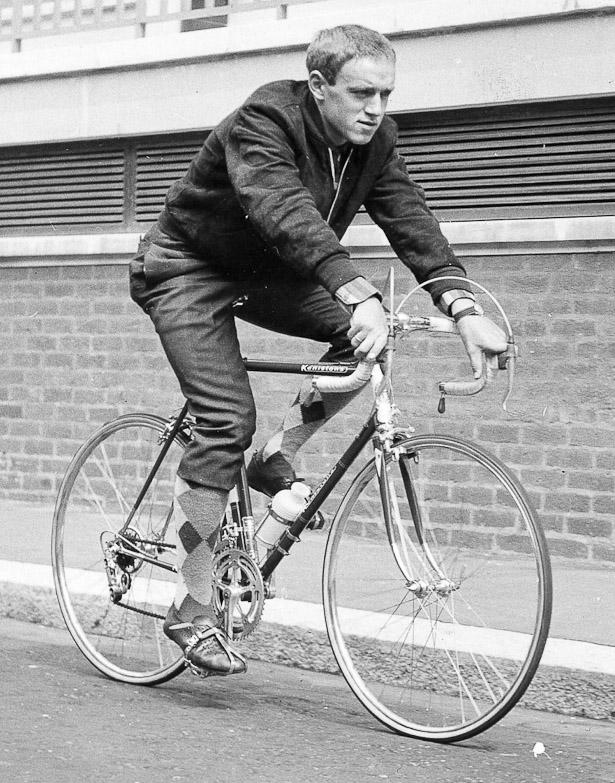
And you worked at Cycling Weekly?
“The editor then was Alan Gayfer, a real larger than life character. There were just three of us producing a weekly magazine which now has a cast of thousands. We were working 80-90 hours a week.
“I’d ride a Sunday race, anything up to 80 or 100 miles and sometimes as far away as Yorkshire, hurtle back to Fleet Street, work through the night, then take the train down to the printers in Bournemouth to put the issue to bed. I’d get home in the early hours of Tuesday, have a short kip then have to be back in the office for 9.30 am – and on one occasion Alan sacked me for being half an hour late. In fact, he sacked me five times in all.
“I took no notice and just turned up for work as usual the next day.
“Alan was the most loyal and generous friend you could ask for out of the office but a nightmare to work with – a real bully.
“But we were all stressed out and he was under enormous pressure from management.
“The Cycling office was in the next room to the Melody Maker. Spencer Davis used to come in regularly to see MM’s Chris Welch. I’d be listening to blues and soul music on pirate radio as I worked into the evening and he’d come and chat to me. He said: “You know so much about music, you should be writing about it” – and that’s how I got to expand my horizons as a writer.
“There were always stars and hopefuls hanging around. I remember Bob Dawbairn, a hard-nosed Scottish sub-editor, throwing this kid out because he was hanging around the office and wouldn’t go away – turns out it was Bob Dylan!”
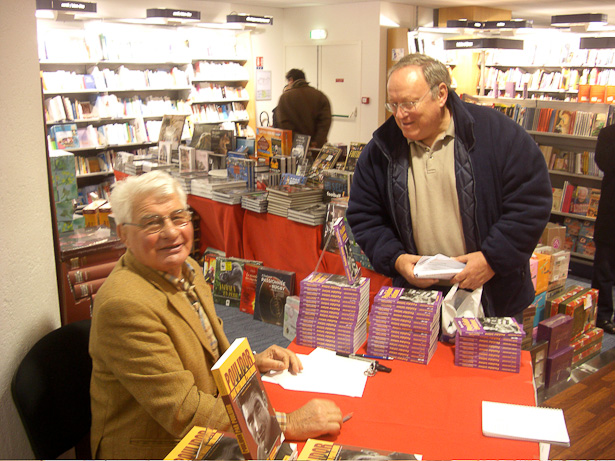
What’s your opinion on the current ‘internet generation’ where anyone with a camera phone is a ‘journalist?’
“The open access of the web is it’s greatest asset but also it worse handicap. If you write a hard copy book then to be published it has to reasonably competent, because you’ve got to find someone willing to fund the editing, production, printing, marketing, sales and so on. That creates an albeit crude measure of quality control
“But anyone can put any old twaddle up on the internet without any financial commitment being necessary and therefore there’s stacks of utter rubbish finding its way on line – and how does one discern what’s accurate and what isn’t.
“For instance, I keep reading that there was a ‘Hercules team in the Tour de France’ – it wasn’t, it was a GB team.
“But when guys like me are dead and gone, errors like that will be accepted as fact.
“I think that just as magazines have their ABC audited circulations, there should be some system of validation for articles on the internet – so that the reader knows how accurate they are.”
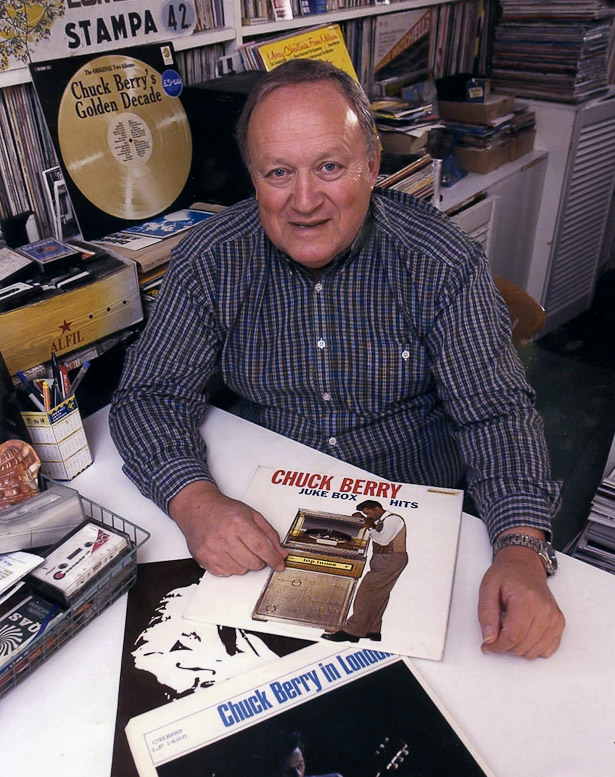
You were around in the BLRC (British League of Racing Cyclists) era – what was with cycle racing’s links to music at that time?
“It was the time of be-bop – and bear in mind that most cyclists who were in the BLRC were radicals and revolutionaries – which is why they liked Charlie Parker rather then Louis Armstrong. The League even had Charlie Parker and Lester Young Memorial races.
“They didn’t want to time trial in secret early on a Sunday morning. They craved the razzmatazz of the Continental road racing scene, with all its excitement. They wanted to road race and the glamour that went with that on the Continent – fancy bikes, colourful jerseys, white socks, racing caps, goggles, spare tyres over the shoulders . . . They even gave many of their clubs exotic names – Velo Club Sacchi, Chesterfield Coureurs and the like.
“And the music they enjoyed was colourful – Chet Baker, Miles Davis, Jerry Mulligan the pioneers of modern jazz.
“Blues and R&B were big too – Fats Domino, Chuck Berry, Little Richard, John Lee Hooker.
“Cycling indirectly got me into all this great music, which I was listening to long before I got interested in pop.
“These records would be playing on the juke boxes at the transport cafes where the club runs and training rides would go – it all just fitted in.
“The legend is that the pop group, The Animals was formed on a club run.”
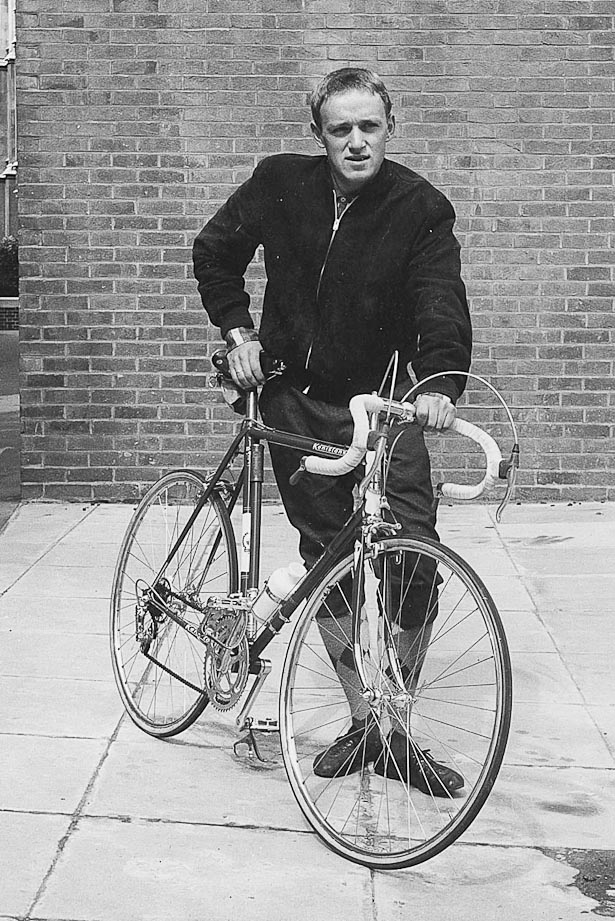
I read one of your pieces once where you mentioned that Marvin Gaye was in to cycling?
“Marvin was a massive talent and a gentle, rather shy man, but he could be difficult, especially when he was snorting white powder up his nose; after he left the Motown record label he had tax problems and sometimes he’d just disappear for a day or two.
“On one of the tours we organised he was to meet Princess Margaret at Lakeside Country Club in Surrey, before doing his show; but we couldn’t get him to come out of his hotel bedroom in London and eventually she left – he couldn’t understand why she wouldn’t wait for him, though he was well aware he was two hours too late.
“He really liked Ostend and was going to buy a house there to get away from all his hassles with the US tax man.
“Marvin’s promoter in Belgium, a nice man named Freddy Coussaert, was big into cycling and was friends with the likes of Rik Van Steenbergen, Rik Van Looy and Eddy Merckx – the rumour was that Marvin had actually been out on a training run with Eddy.”
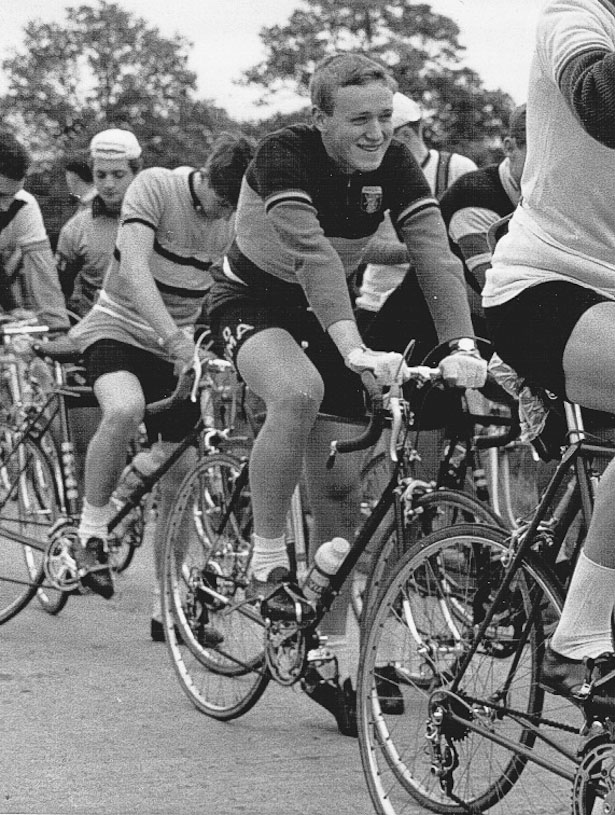
As a man who’s ‘been there’ – which was the best decade for cycling?
“To my mind, the mid to late 50’s were the best time for the sport – the golden age. People talk about the 60’s – undoubtedly, the music was great and at least until the student riots of ’68, there was a pervading optimism, a sense that things were on the up and up.
“Things were becoming far more egalitarian – David Bailey, a working class lad, was able to become the top society photographer, but I think they were a shit time in so many ways. Few had central heating, many had outside toilets and no bath, our food had little variety and the shops were full of crap.
“It was a disposable society and most things we bought were rubbish. On the other hand, if the boss asked to see you it was not to give you your cards but a raise you hadn’t even asked for because he was scared you might leave and he might not be able to find a replacement. It was a rare time when, for once, labour had the whip hand over management.
“For cycling, though, it was a traumatic time. As soon Lambretta and Vespa scooters and cheap cars like the Mini and Ford Anglia came along, everything changed.
“There were 100,000 people a year riding time trials alone back in the 50’s but numbers plummeted at the dawn of the ‘Sixties. Bike shops closed, clubs folded, races disappeared and the bicycle industry was in crisis.
“Another thing about the 50’s there was real strength in depth in the peloton. People go on about Eddy Merckx in the 70’s – sure he had De Vlaeminck, Gimondi and Maertens to contend with; but look at the sheer quality of the opposition Fausto Coppi – ‘Il Campionissimo’ (‘The Champion of Champions’) – faced in the 50’s. He was up against Bobet, Magni, Bartali, Van Steenbergen, Kubler, Koblet – the super-legends of the sport, each with a superstar palmares.
“The second string was formidable too: Robic, Ockers, Fornara, Gauthier, Darrigade and the rest.
“Louison Bobet was my super hero. As a 16 year-old, training around the Essex lanes on the legendary ‘Loop’, I used to imagine I was him climbing the Izoard. In my mind the third cat whose back wheel I was fighting to hold was Fausto Coppi and the lad romping up the hill ahead of us was Charly Gaul.
“Bobet’s brother Jean, who became a journalist after a distinguished racing career of his own, wrote a book titled ‘Tomorrow We Ride’ about his time racing with his brother.
“I was asked to write a forward for the book and in it I related my teenage fantasy, prompting Jean to write the following dedication in my copy of the published book: ‘To Roger St.Pierre, who once was Louison Bobet.’!
“Not convinced? – then check out the speeds of the Classics from the 50’s. They’re not slow; and that was on 25lb bikes with eight gears.
“Go to the track and check the times which Reg Harris was doing – they weren’t slow, either.
“Coppi was elegant but fragile – he did race past his ‘sell by’ date but still retained that authority, that aura of majesty which he’d had at his peak.
“Of course, it was in many ways easier then to create legends. Back then the riders were more accessible to the public, but at the same time there wasn’t the same TV and internet coverage so the riders had more of an aura, a mystique, if you like.
“For instance you didn’t hear them speak – so you didn’t know if they had a squeaky voice which wouldn’t have suited their image as hard-men.
“I remember walking through the dressing room after the finish of the Paris-Brussels classic and accidentally bumping into Rik Van Looy – the tough and ruthless ‘Emperor of Herrentals’ – as he emerged from the showers. Our shoulders clashed, I sent him sprawling to the ground. When he picked himself up I expected this renowned hard man to land one on me but instead he rather sheepishly apologised I almost felt disappointed!”
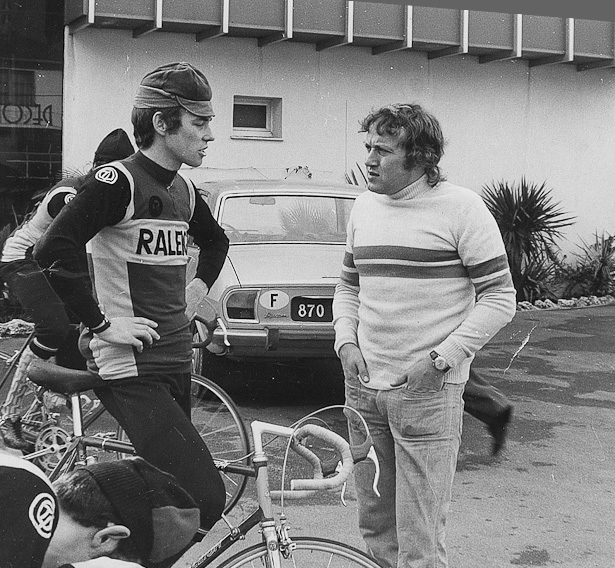
I remember you taking British riders to the Circuit du Port de Dunkerque in the 70’s.
“I was involved with that race for 35 years. One year I took 88 Brits over. We actually outnumbered the French and Belgian contingents combined.
“I took the Falcon and Holdsworth teams in around ’64-’65 and after that the entire UK pro/independent peloton. Our best performance was Nigel Dean’s second place to Patrick Sercu. Later the race went amateur.
“The passing of the Verley brothers, who headed the organisation, and then loss of sponsorship led to the event folding but I was pleased to discover recently on the internet that it has now been revived, though the date is now in May, rather than the traditional August.
“I had a ’65 Mercedes 300 SEL; we’d put four bikes on the roof and three in the boot and off we’d go – that was the best car I ever had.”
What are your views on cycle sport in the current era?
“I like the World Cups and Revolutions – that’s credible racing.
“But I don’t like what’s happening at the Olympics; the programme is changed at the behest of IOC people who have no knowledge of cycling – who’ve never even ridden a bike.
“To take away the kilometre and pursuit is unforgivable – sure you should allow for more women’s racing but don’t use it as an excuse to slash the men’s programme.
“I’m not against the omnium – but it’s never an Olympic event.
“And the rules governing the weights of bikes are nonsense – the unfair advantages come from drugs, not light bikes.
“And as for competitors having to cover up ‘worlds bands’ on their bikes at the Worlds and Olympics – it’s ludicrous.
“And one event I would add to the Worlds programme is a mountain climb – imagine the best climbers in the world battling for a rainbow jersey on the Ventoux or Stelvio or Pike’s Peak.
“I also think that they’ve lost the plot by always having the Worlds on a 250 metre indoor track – it limits the tactics sprinters can employ and in the endurance racing taking a lap becomes something different on a big 333 metre concrete track.
“On the small tracks the fields are limited – if you have a big track then you can have 60 or 70 riders up for the endurance races.
“Maybe there should be an outdoor summer Worlds on a big track and indoor winter Worlds on a small track?
“Lance Armstrong hasn’t been good for the sport (he didn’t know how right he was with that statement, ed.) – the ‘rock star’ thing isn’t what it’s about.
“It’s the “people’s sport” – Poulidor would sit on the steps and chat to the kids and I can remember Andrea Taffi and Francesco Moser taking a couple of Malaysian amateur lads out on a training ride – that’s like David Beckham having s kick-about on Wanstead ~ Flats, and I can’t imagine that ever happening.”
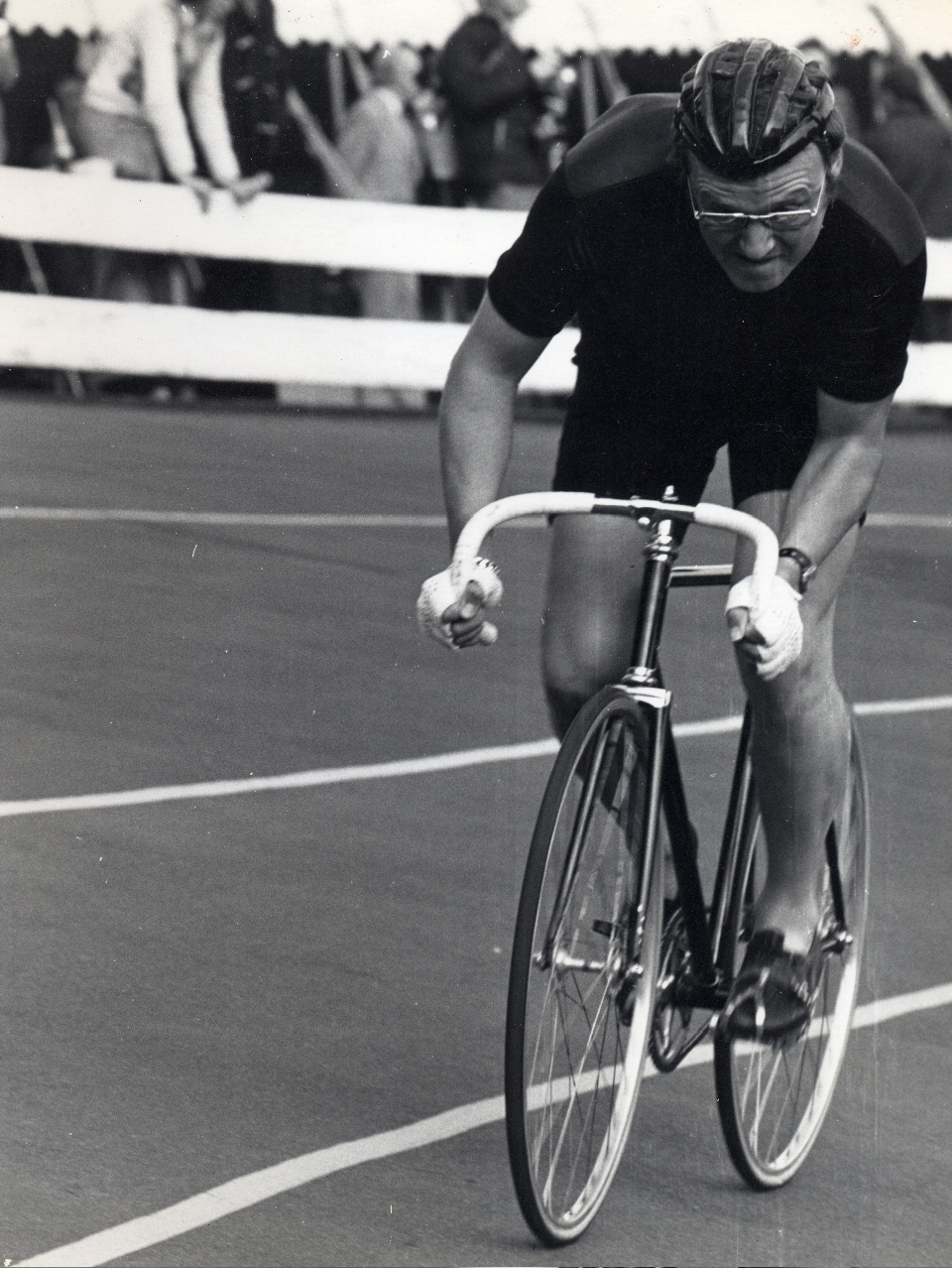
Regrets?
“I’d have loved to be a professional.
“But I like that I’ve touched people’s lives. I wrote a piece in which I ranted that there weren’t enough cyclists’ cafes.
“So this chap comes up to me says that he read the article and went off and opened one!
“And I always remember Phil Griffiths coming up to me at the start of a Tour de France stage and saying; ‘You made me waste my life, Roger – I read an article you wrote about how to go about racing abroad. It prompted me to hand in my notice, take my savings and head off to France for a life as a racing cyclist.’“
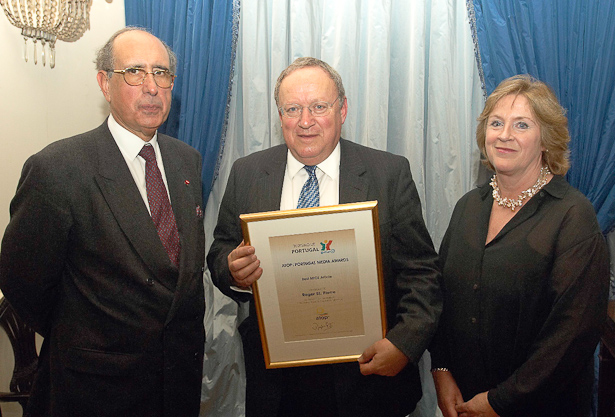
With thanks to Roger St. Pierre for his time and long may we look forward to seeing his ‘by line’.



